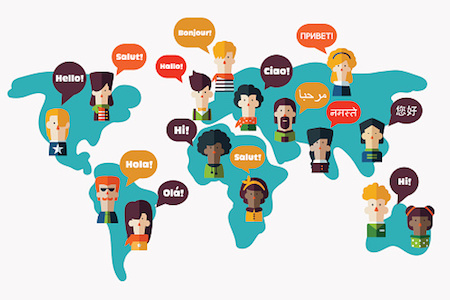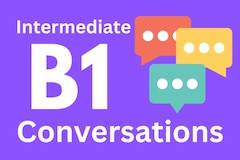
What languages do you speak?
Two people discuss the languages they speak or want to learn.
Todd: So, Abidemi, let's talk about languages.
Abidemi: Sure.
Todd: You are from Nigeria and Nigeria has many languages, correct?
Abidemi: That's true, yes.
Todd: How many languages can you speak?
Abidemi: I would say that I can speak one language very well.
Todd: Me too.
Abidemi: And that would be English. But, I speak other languages fairly well. Yoruba, which is a Nigerian language, French, and a little bit of Japanese as well.
Todd: You are Canadian also, and in Canada, students study French, correct?
Abidemi: That's true, yes.
Todd: Do you speak French often in Canada?
Abidemi: While I was living there I spoke it a lot more, yes.
Todd: Do you like French?
Abidemi: I love French. I love learning languages.
Todd: French, I think, is very hard for some people, myself included, because the pronunciation of some words is very different than the pronunciation of American English. I think it's funny that there are some words in French that look exactly the same as words in English but we pronounce them completely differently. For example, I will say the word in English, and you say the same word in French. Okay?
Abidemi: I will try.
Todd: For example. Impossible.
Abidemi: [French 00:01:46].
Todd: Right, so that is so interesting. Again, impossible.
Abidemi: [French 00:01:49].
Todd: And they're spelled the same, correct?
Abidemi: That's true.
Todd: Yeah, how about reservation?
Abidemi: [French 00:01:56].
Todd: That's so cool.
Abidemi: I have never thought of it like that before, Todd, but you're right. They look the same but the pronunciations are different.
Todd: I think it's a trick because we see the word, and we know how to say it one way, but we have to say it a different way.
Abidemi: That's true.
Todd: We just can't do that well.
Abidemi: That's true.
Todd: So, you can speak Yoruba.
Abidemi: Yoruba, yes.
Todd: Yoruba. How do you say, "How are you?" In Yoruba.
Abidemi: [Yoruba 00:02:33].
Todd: Oh, that's so cool. Again?
Abidemi: [Yoruba 00:02:35].
Todd: [Yoruba 00:02:37]?
Abidemi: [Yoruba 00:02:38].
Todd: Oh wow. That's so cool.
Abidemi: Thank you.
Todd: Have you ever taught that language?
Abidemi: No, never. I don't think too many people want to learn it outside of Nigeria.
Todd: I think, in the future, more people will want to learn unique languages.
Abidemi: I hope you're right.
Todd: Yeah, maybe.
Abidemi: Maybe.
Todd: What language do you want to learn in the future?
Abidemi: I have many that, if I had more time, I would like to learn. I'm interested in Japanese, of course. I live in Japan now, so I would like to speak it better. I would also like to learn Mandarin, Russian, Hausa, another Nigerian language, Spanish, and maybe a couple of others.
Todd: Yeah, there's so many languages I want to learn. I want to learn Spanish too. I can speak some Thai and Japanese because I lived as a teacher in both countries. But, I want to learn a language that has the same alphabet. I can read Thai but not very well. I can read Japanese but not very well. I want to learn a language where it's easy to read and see what the word is. In Thai, you can't do that. In Japanese, you can't do that.
Abidemi: I know what you mean. It would make it easier to learn the language.
Todd: But in Russian, you can't do that.
Abidemi: That's true.
Todd: It's completely different.
Abidemi: That's true, but they have alphabets that are the same. You just have to decode them.
Todd: A little bit, yeah. We have the phrase, it's all Greek to me, which means you have no idea. Anyway, thanks a lot, Abidemi.
Abidemi: Thank you, Todd.
Languages, Nationalies and Countries
I am from Germany.
He can speak French.
I love Thai fod.
People speak Spanish in Spain.
She is Italian, but does not speak Italian.
We bought a Japanese car in Japan.
Nationalities
| Country | Nationality | Country | Nationality |
| Japan | Japanese | Thailand | Thai |
| China | Chinese | Korea | Korean |
| Sweden | Swedish | Greece | Greek |
| Germany | German | Poland | Polish |
| Italy | Italian | Portugal | Portuguese |
| France | French | Turkey | Turkish |
| Spain | Spanish | Finland | Finish |
| Mexico | Mexican | Colombia | Colombian |
| Canada | Canadian | Brazil | Brazilian |

Prepositions
















